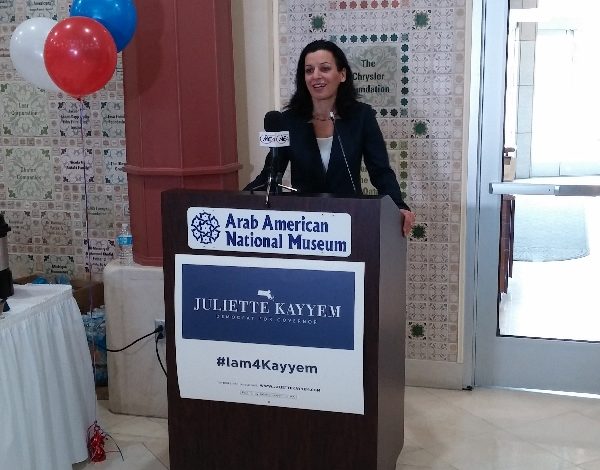
DEARBORN — Massachusetts gubernatorial candidate Juliette Kayyem said her Lebanese American roots are what motivated her to enter the governor’s race, while speaking at a campaign fundraiser at the Arab American Museum in Dearborn, on Monday, March 25.
Activists and local officials attended the event, which was organized by community leaders in cooperation with Kayyem’s campaign.
Kayyem recalled how her grandmother, who immigrated from north Lebanon to Kentucky, before moving to California, would wave a Ziploc bag containing her immigration papers at her grandchildren and tell them, “I belong.” Kayyem added that she did not understand what her grandma meant until she was asked by President Barack Obama to oversee the naturalization ceremony of 400 immigrants, including 22 from Lebanon.
“Who we are as Americans is only defined by how much we engage in our communities. There is no old guard or new guard. There is ‘us’ and our commitments to our communities in all sorts of ways, as lawyers, as doctors as educators, as businessmen and as politicians. It is that sense of belonging that drove me to this race,” she explained.
Kayyem has served as a civil rights attorney, national security official for the federal government and the state of Massachusetts, as well as a columnist for the Boston Globe. She graduated from Harvard Law School with a Juris Doctor in 1995. She has three children and resides in Cambridge with her husband David Barron, a professor of public law at Harvard Law School.
Kayyem said she believes in government’s capacity to do good but also believes that government can always do better. She added that she entered the race for governor in Massachusetts because she is the daughter of a Lebanese immigrant family who thinks that there is no “finish line” for continuous work.

She described Dearborn as her “adopted hometown,” adding that she had been awarded a key to the city by Mayor Jack O’Reilly Jr. during her tenure at the Department of Homeland Security (DHS), where she worked to increase cooperation between DHS and the community in Dearborn.
Kayyem talked up her own credential for the Massachusetts governor’s office, describing herself as the “strongest Democrat” to face the Republican candidate in the general elections because of her appeal to independents. “I am not an ideologue,” she said. “I just want government to work.”
She added that her platform emphasizes improving education, infrastructure and comprehensive immigration reform.
The Harvard graduate asked the crowd to “spread the word about this great campaign.” “I belong, you belong and we all belong to this race. I’m incredibly grateful for your time and your support,” she said.
Kayyem, 44, said she represents a wave of diverse, young politicians who can appeal to the younger generation. She added that Lebanese women’s involvement in politics reflects their reputation as strong-willed individuals.
“Lebanese women have always been forceful and opinionated and taken on leadership roles in many fields, and politics is just a new one,” Kayyem told The Arab American News.
She added that cooperation between Arab American communities across the country is “key” to their success.
Mariam Bazzi, the president of the Arab American Political Action Committee (AAPAC), praised Arab American womens’ bids for leadership positions, adding that they have shown their “ability to succeed.”
Bazzi urged people in the community to contribute to Kayyem’s campaign. “That’s the most effective way to support her. Any contribution is important, no matter how small,” she said. “We have an opportunity to make history.”
Businessman Ali Jawad, who helped organize the fundraiser, said Arab Americans are proud of Kayyem and described her as an “inspiration” to the community. “Her candidacy can be a motivation for our women to get involved. We can have 100 Juliettes down the road,” he said. “It can provide encouragement for us to follow in her footsteps.”
Jawad added that supporting Arab American politicians across the country gives the community an opportunity to voice its concerns directly to the government, instead of relying on traditional organizations.
Community activist Suehaila Amen, who was one of the organizers of the event, said Kayyem was enthused to meet the local community. She added that supporting Kayyem increases Arab Americans’ political presence nationally.
“Having Juliette here helps us to cross the cultural and social boundaries and pave the road for us to have a recognized voice on Capitol Hill,” she said.






Leave a Reply